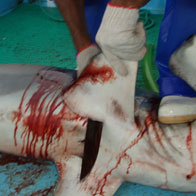Update:
May 2012
Great news! In 2010 Ethical Traveler launched a campaign with PRETOMA to end shark finning in Costa Rica.
The campaign had a major impact and our petition to close down the private docks was successful. Customs Laws are now properly enforced and loopholes have been tightened to help prevent shark fins entering through public docks.
We also had a major victory in the establishment of a new Marine Protection Area around Cocos Island and a coastal MPA is in the process of being created in Caletas.
Thank you for all your fantastic support in this campaign.
There is still more that can be done to prevent illegal shark finning. Shark fins are still entering Costa Rica by land having been dismembered in Nicaraguan waters and enforcement of customs laws in private docks remains difficult. The establishment of shark quotas and banning of directed shark fisheries would go some way to preventing this avenue as would properly labeling shark meat ensuring consumers are knowledgeable of the products they purchase. In this light PRETOMA are continuing their hard work and are also working on getting hammerhead sharks in CITES too. For more information and ways to act please visit www.pretoma.org/campaigns/say-no-to-shark-fin-import.
Once again thank you for your support in helping prevent shark finning in Costa Rica.

Once a shining star on Ethical Traveler’s “Ethical Destinations” list, Costa Rica won acclaim for its policies promoting environmental protection, social welfare and human rights. But the popular destination was dropped from our list when it became one of the world’s main hubs for sex trafficking. Today, Costa Rica is wrestling with another menace: shark finning.
Shark finning is the act of slicing off the fin and discarding the living shark back to sea, where it dies a horrible death. The amputated fins are then exported to Asia, where they are used to make an ominous delicacy: shark fin soup (as journalist John Platt calls it, “extinction in a bowl”). Shark finning is responsible for the death of some 200 million sharks each year—contributing to a 90% decline in global shark populations.
Costa Rican native Randall Arauz (winner of a 2010 Goldman Environmental Prize) has succeeded in getting his government to pass a law forbidding shark finning, which requires that sharks be “landed” with their fins attached. Though the law doesn’t prohibit shark fishing, it slows the slaughter of sharks by limiting by the storage capacity of the offending fishing ships.
The passage of this law was a major victory—but it wasn’t long before the shark finners, in complicity with the fisheries authority, found bizarre loopholes. To increase their catch, they tied the fins of larger sharks onto smaller shark bodies with string, and declare the fins technically “attached.” This enabled them to store more fins on board. Arauz got this loophole closed—and sharks were required to be landed with their fins naturally attached.
Still, the slaughter of sharks continues in Costa Rica.† Taiwanese finning ships are now docking illegally, at private facilities, to escape the reach of the law. Arauz’s new challenge is to step up enforcement of a policy requiring international vessels to dock at public facilities where they can be monitored, as current customs law dictates.
Arauz is also launching a campaign to discourage Costa Ricans from eating shark meat, which is often concealed behind different names—such as cazón, bolillo, and bolillón—and consumed unknowingly.
Ethical Traveler has partnered with Arauz’s PRETOMA organization (www.pretoma.org) to save the sharks, and help Costa Rica reclaim its place as an eco-friendly destination. Please take action by signing our campaign letter. We will “snail mail” these to the proper authorities in Costa Rica, reminding them that we have a choice of where we travel, and requesting that:
- Costa Rica’s customs laws be strictly obeyed, even in privately owned docks;
- Shark meat be properly labeled, so that consumers are not misled;
- Directed shark fisheries be banned, and shark quotas established;
- Marine Protected Areas be created in coastal waters that serve as critical habitats for sharks, and in oceanic migratory corridors between Cocos Island National Park (Costa Rica) and Galapagos Islands National Park (Ecuador).
Thank you for taking a few moments to support this important Ethical Traveler campaign, and for coming to the rescue of this majestic and endangered fish!
* If you are a U.S. citizen, please consider writing to your Congressional representative and asking him/her to support the approval of the Shark Conservation Act, now under consideration by the US Senate. This would mandate a “fins attached” policy, and would allow the US to openly support this policy in international forums with Costa Rica.
Read Ethical Traveler's Reprint Policy.
